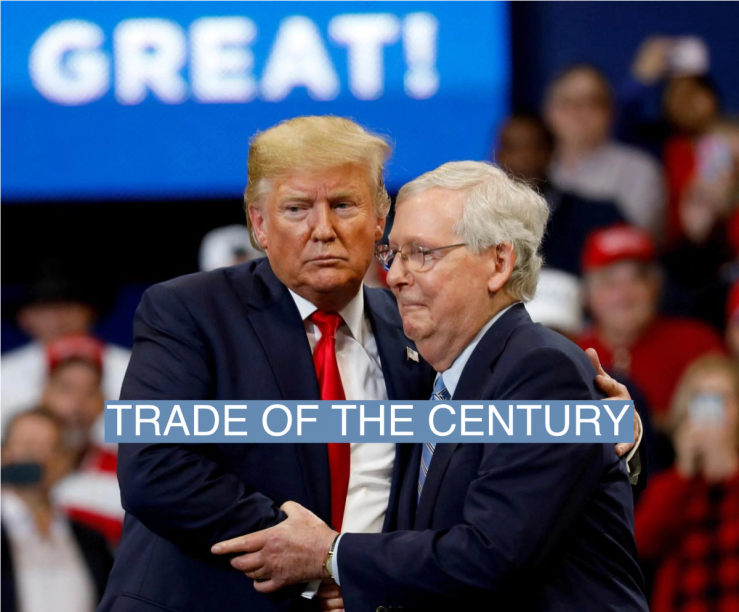The News
Mitch McConnell will be remembered for many things, but two stand out above all others: His decision to block a Supreme Court appointment and his decision to acquit Donald Trump in the wake of the Capitol riot. The first cemented his legacy within the party while the second now threatens to destroy it.
In this article:
Benjy’s view
McConnell’s influence was so great that, as recently as 2021, there was a plausible case that this period might be remembered by historians as the McConnell Era more than the Trump Era in terms of real-world impact.
In this version, the longtime Senate leader was quietly the Republican Party’s main character. From his perch atop the Senate GOP, he predated and outlasted Donald Trump while exploiting his aberrational one-term presidency to score the conservative achievement of the 21st century: A judiciary remade in their image.
Trump may embrace the court as his top legacy item now, but this was always McConnell’s project. He led the charge against President Obama’s judges, setting himself up for the decisive tactical blow — holding a Supreme Court seat open after Antonin Scalia died. Trump finished the job by nominating judges off a pre-approved list in order to advance various causes, like abortion, that he mostly showed little interest in before entering Republican politics.
Having exploited Trump’s presidency to the fullest, McConnell seemed eager to move past their shotgun marriage at its end and retake control of his party. After Jan. 6th, McConnell felt “exhilarated by the fact that this fellow finally, totally discredited himself,” Alexander Burns and Jonathan Martin reported in their book, “This Will Not Pass.” He said that Trump “put a gun to his head and pulled the trigger” and that it “couldn’t have happened at a better time.”
The irony is that the next biggest decision of McConnell’s career is the one that guaranteed Trump was here to stay, and would likely subsume McConnell’s legacy for good.
After the attack on the Capitol, McConnell telegraphed interest in impeaching Trump, who he later called “practically and morally responsible” for the events of January 6th. But he decided to let him off on a technicality, arguing presidents couldn’t be convicted if the trial took place after they left office, and that the criminal justice system could hold Trump accountable instead.
Trump likely would have survived impeachment without McConnell’s help, which was clearly influenced by the mood of his party. But McConnell’s decision to first delay the trial while Trump was still off-balance, and then come out against conviction, guaranteed it. He — and he alone — had the ability to launch an actual Republican offensive that might have sidelined Trump, starting with a vote that prevented him from running for president. Even without his support, seven Republicans (to this day, a shocking number) voted for conviction.
After that, McConnell decided the pragmatic move was to forget Jan. 6th and Trump’s broader transgressions as quickly as possible in order to heal party divisions. In a move that surprised some colleagues, he opposed an independent commission to investigate Jan. 6th, leaving Nancy Pelosi and Liz Cheney to do the work in the House. Instead, he quietly encouraged senators to patch up some election vulnerabilities that Trump exposed.
Meanwhile, Trump reasserted himself over the party. Within weeks of his acquittal, his conservative critics were ousted in the House. Within months, McConnell was forced to publicly endorse flawed Trump-favored candidates like Herschel Walker who would soon cost him a majority in the midterms. And now, Trump is poised to retake the nomination, likely with the voices of January 6th rioters singing the national anthem at his convention.
Should Trump win in November — and even if he loses — he will likely play a major role in choosing McConnell’s successor. Every cycle brings more MAGA faithful to the Senate, replacing the older Republicans who McConnell leaned on to, if nothing else, keep the lights on and raise the debt ceiling. Ukraine aid, McConnell’s top priority, remains under grave threat while Trump campaigns on encouraging Russia to invade NATO allies who don’t pay up. McConnell’s preferred solution — a bipartisan border deal attached to the funding — died after Trump personally lobbied against it.
McConell wasn’t totally quiet while all this happened. In rare moments, like when Trump spat racist invectives at his wife, he pushed back with a wry comeback. After Trump dined with a neo-Nazi, and briefly looked vulnerable to a primary, McConnell observed that “anyone meeting with people advocating that point of view, in my judgment, are highly unlikely to ever be elected president of the United States.”
The quote was emblematic of the party’s mindset under McConnell, who never endorsed a rival candidate: Someone would surely stop Trump one day — not them, of course, but someone. What McConnell’s critics knew, and that so many Republicans tried to avoid learning, was that to not confront him in the open was to surrender without firing a shot. There’s no question whose party it is now.
Room for Disagreement
Some McConnell defenders have argued that his conference ran by consensus and that his ability to push it toward an impeachment conviction was overstated. “It wasn’t going to happen — he wasn’t going to be a leader who stood with 15 percent of the caucus,” one McConnell advisor told Martin and Burns.
Notable
- The Associated Press offers its first take on McConnell’s departure, noting his role in the impeachment trial, remaking the courts, and his support for a muscular foreign policy.


